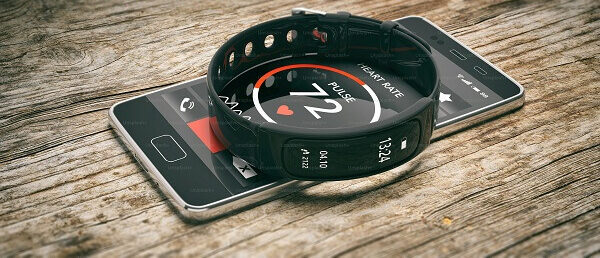Rise of Fitness Tracker as Evolution of Health and Wellness:
Fitness Tracker
In a world of technology that exceeds our daily lives, fitness trackers have emerged as one of the most significant tools to promote health and wellness. These highly innovative devices have changed the way one understands fitness, making it easier than ever to monitor physical activity, track progress, and stay motivated. In this article, we shall explore the features, benefits, and impact on our daily lives about fitness trackers.
What is a Fitness Tracker?
A fitness tracker is a form of wearable device that can count and record several health-oriented metrics, such as tracking your physical activity. Existence – There are numerous fitness trackers on the market, ranging from wristbands to smartwatches, with sensors that can track step count, heart rate, sleep pattern, and even calorie consumption in some cases. Many integrate smartphone technology to allow syncing so the user can see their data in real time.
Key Features of Fitness Tracker:
1. Activity Tracking:
For fitness trackers, of course, the first important feature is to measure physical activity. Most devices are capable of counting steps taken during the day. That way, users can get an actual amount of movement for their daily record. This functions as a stimulus to set one’s goal and improve an active lifestyle, avoiding a sedentary life in general.
2. Heart Rate Monitoring
Most wearable fitness tracking devices come with an optical heart rate sensor that continually monitors the user’s heart rate. This is an important feature to understand cardiovascular health and will enable users to estimate the level of intensity of their workout. Additionally, monitoring the heart rate at such times can help people within target heart rate zones to maximize their workout.
3. Sleep Tracking:
No doubt, quality sleep is very important to everyone for general health and with fitness trackers, everyone has made it easier to track the quality of sleep. Instead of time or hours, people can learn about their sleep patterns and patterns. They will get an in-depth report about sleep stages and how much time they spend in light, deep, and REM modes. Users will be able to make adjustments at the right time to get better rest.
4. Calorie Counting:
Another feature that can be monitored is the daily caloric burn, estimated from the activity level, heart rate, and more. Users can use this feature to properly control their weight as they go about losing or gaining weight or maintaining it as is.
5. GPS and Location Tracking:
For outdoorsy types, many exercise trackers also come with integrated GPS functions. This way, routes can be tracked during running, cycling, or even hiking. With a GPS feature, users can even monitor their pace and distance.
6. Smartphone Integration:
Most fitness trackers sync with the smartphone to provide users with a comprehensive view of their health data via apps that are exclusively dedicated to this purpose. Such apps regularly send other features, which may range from customized workout plans and community challenges to remind users to stay active.
Advantages of a Fitness Tracker :
1. Increased Motivation:
One of the biggest benefits of fitness trackers is that they motivate the wearer. With real-time feedback and tracking of progress, this equipment inspires a person to set up and attain fitness goals, as long as he or she can see where he or she has been, where he or she is now, and how far he or she is yet from attaining goals. A high number of these trackers allow users to identify and celebrate milestones, which further boosts motivation.
2. Increased Accountability:
Through fitness trackers, the user can monitor his activity levels continuously; hence, it promotes accountability. In such a manner, the users will stay with their routine if they know that their movements are being tracked. Such accountability makes the choices and practices for a healthier life.
3. Personalized Health Insights:
On some fitness trackers, personalized insights are offered based on individual data. They track progress over time so that one can be able to determine the patterns and areas of improvement. This approach to personalization ensures that an individual learns and decides on his or her fitness and health goals.
4. Improved Health Awareness:
There is more awareness of the individual about one’s health and activity because of wearing a fitness tracker.
Various data that are provided by the device, including daily steps, heart rate, and quality of sleep, give users more insights into one’s health. These bits of awareness can prompt the individual to make a change such as increased activity or higher-quality sleep.
5. Social Interaction and Community Support:
Most fitness-tracking apps have social features where users can connect with friends, join challenges, and share their achievements. Such a sense of community might be the additive force that makes fitness enjoyable.
Choosing the Correct Fitness Tracker :
There are many fitness trackers available today, and it has become very confusing to pick the right one. Here are some important aspects to look for when choosing a fitness tracker.
1. Compatibility:
Ensure that the fitness tracker you’ve settled on is compatible with your smartphone and other devices you’ll be using. Most fitness trackers sync with either an Android or iOS device, thus ensuring that it is compatible with what you’re going to have it integrate with usually before making any purchase.
2. Features:
Consider what features are most important to you. Are you an outdoors person? If you spend a lot of your running time running away from your house, you may want a tracker that has GPS capabilities. Do you focus a bit on heart health? You might focus on accuracy for heart rate monitoring.
3. Design and Comfort:
Because a fitness tracker is always worn, comfort and design are essential. Find a tracker that fits comfortably on the wrist as well as fits into your style or taste. Most brands offer a variety of colors and designs.
4. Battery Life:
The conclusion is that battery life will differ depending on the fitness tracker one chooses. There are devices that even need to be charged every day, and there are others that will last up to a couple of days or even weeks on a single charge. Then there are people whose lifestyles are really busy and hardly have time to allow a recharge of the device, and thus they settle for one that can last for as long as possible.
5. Price:
Fitness trackers come with a huge price difference, and you have your budget-friendly affordable options, high-end smartwatches, and everything else in between. So determine what your budget is and what kind of functions you want to enjoy without draining your account.
Impact of Fitness Tracker on health and fitness:
Fitness trackers have greatly contributed to the present way of thinking regarding health and fitness. Such devices have brought about a healthier-minded society which exerts people to improve their exercise and overall well-being. There have been studies that indicate the implementation of the desired fitness plans by those who use the fitness track significantly as opposed to those who do not.
1. Behavior Change:
Studies have determined that fitness tracking does impact behavior. Individuals who monitor activity levels regularly experience an increase in daily steps and exercise. This, in turn, results in the improvement of general health since chronic diseases are less likely to occur.
2. Data-Driven Decision Making:
Data from such wearables can be used to inform health-related choices. Whether it is adjusting the intensity at which one should work out, or there is a pattern in the quality of sleep, the insights that come with such wearables empower individuals to start owning their health.

3. Preventive Health:
By promoting increased activity levels and vigilance of health indicators, a fitness tracker could be used in preventive health. Exercise regularly improves sleep and healthy food choices will reduce the risk of obesity heart disease and other lifestyle-related conditions.
